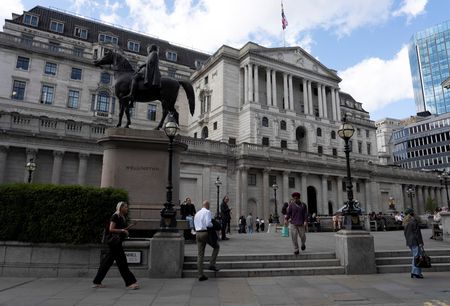By David Milliken
LONDON (Reuters) -Bank of England Monetary Policy Committee member Catherine Mann said on Tuesday that she saw a strong case to keep Bank Rate on hold for a prolonged period but stood ready to cut rates forcefully if downside risks to growth materialise.
Mann voted against this month’s quarter-point rate cut to 4% – as she has against most of the BoE’s rate cuts over the past year – and said she believed that upside risks to inflation identified by the BoE in May were now beginning to crystallise.
“A more persistent hold on Bank Rate is appropriate right now, to maintain the tight – but not tighter – monetary policy stance needed to lean against inflation persistence persisting,” Mann said in remarks released by the BoE.
“However, I stand ready for a forceful policy action, in the form of larger, more rapid Bank Rate cuts, should the downside risks to domestic demand start materialising,” she added in the speech to be given later on Tuesday at a conference to mark the Bank of Mexico’s 100th anniversary.
Earlier this month the BoE revised up its near-term inflation forecast to 4% for September and forecast that inflation would not be back at its 2% target until the second quarter of 2027.
In March, Mann talked about U.S. research showing that households became more focused on inflation once it reached 4%, but she said on Tuesday that subsequent BoE research showed this threshold was lower in Britain at 3.0-3.6%.
Mann also highlighted how wage growth in Britain was running faster than could easily be explained by the central bank’s models of supply and demand in the labour market and that forecast pay growth of 3.5-4.0% for the end of this year was too high to bring inflation back to 2%.
Higher interest rates would bring inflation back to target sooner, but Mann said tightening monetary policy was not the right choice due to the weak growth outlook and her desire to avoid raising rates only to then have to cut them soon after.
“The trade-off between persistent inflation persistence and quite weak GDP growth remains,” she said.
(Reporting by David Milliken; editing by Sarah Young and Kate Holton)












